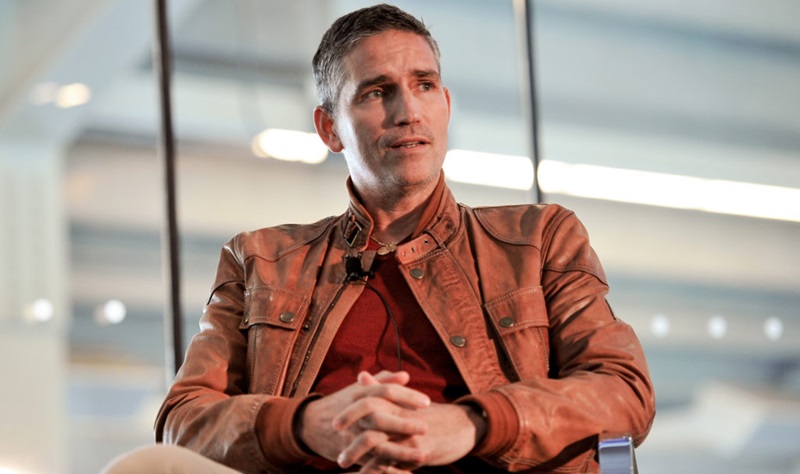Jim Caviezel, a phenomenal actor, was born on September 26, 1968, in Mount Vernon, Washington. His initial years passed in a close-knit Catholic family that had a profound influence on his values, beliefs and eventually, his career choices. Known for his striking features and deep, resonant voice, Caviezel initially pursued a career in basketball. However, an unfortunate foot injury abruptly ended his dreams of a sports career, and instead, he turned to acting, a choice that would change his life forever.
In 1991, Caviezel made his debut in the film ‘My Own Private Idaho’. His talent shone brightly, and he soon made a name for himself in Hollywood. He made several appearances in movies and TV series such as ‘The Wonder Years’, ‘The Rock’, ‘G.I. Jane’, and ‘The Thin Red Line’.
However, the pivotal moment in his career came when he was cast as Jesus Christ in Mel Gibson’s controversial film ‘The Passion of the Christ’ in 2004. Despite the physical and emotional strains he experienced during the filming, Caviezel’s performance was nothing short of remarkable, earning him widespread recognition and praise.
Despite the fame and success that followed his role in ‘The Passion of the Christ’, Caviezel remained grounded. He continued to pursue roles that aligned with his personal beliefs and values, including his portrayal of John Reese in the CBS series ‘Person of Interest’. This role further solidified his reputation as an accomplished actor in the television industry.
Off the screen, Caviezel is known for his strong faith and philanthropic efforts. He and his wife, Kerri Browitt Caviezel, whom he married in 1996, have adopted three children from China, two of whom had special needs. Caviezel’s life and career have been marked by his unwavering commitment to his faith and the courage to stand up for his beliefs, even when they clashed with the mainstream Hollywood culture.
In 2018, Caviezel returned to the religious genre by portraying Luke in the film ‘Paul, Apostle of Christ,’ which again demonstrated his dedication to roles that reflect his faith. His latest venture in 2021, ‘Sound of Freedom,’ in which he plays a former U.S. government agent battling child trafficking, aligns with his advocacy for the less fortunate and those unable to defend themselves.
Throughout his career, Caviezel has demonstrated an extraordinary capacity to immerse himself in diverse roles, from historical figures to fictional characters, earning him a distinctive place in Hollywood. Despite facing many hurdles, both personally and professionally, his unwavering conviction in his values and beliefs have carried him through, making him an inspiration to many. His life story serves as a testament to the power of perseverance and the impact one can make when they stay true to their faith and principles.

Major Roles and Achievements
Major roles and achievements are essential elements that define one’s journey in any professional field. These components act as a reflection of one’s dedication, perseverance, and hard work. Major roles, essentially, are the responsibilities and duties one performs in their professional environment that contribute significantly to the successful operation and growth of an organization or institution. These roles can be as diverse as leading a team, managing a project, or inventing a new product or service.
Achievements, on the other hand, are the milestones one accomplishes throughout their professional journey. These are often recognized and rewarded by the organization or the industry. Achievements can take many forms, from exceeding a sales target, successfully completing a critical project, to gaining recognition for innovative work. Both roles and achievements are intrinsically interconnected, as the effective performance of one’s roles often leads to noteworthy achievements. They also serve as a measure of an individual’s capabilities, talents, and potential, influencing their career progression and personal growth.
Moreover, major roles and achievements not only shape an individual’s professional identity but also inspire and motivate others in the organization or industry. They create a positive ripple effect, fostering a culture of excellence, innovation, and continuous improvement. Therefore, major roles and achievements hold a significant place in shaping the future of organizations and industries, as well as the individuals who contribute to their success.
Awards and Honors
Awards and honors serve as important recognition for excellence in various fields and can be a significant factor that boosts an individual’s or organization’s reputation and credibility. They are typically granted for exemplary performance, significant contributions, and outstanding achievements in numerous domains such as academics, arts, science, sports, and public service. This form of acknowledgment not only validates the recipient’s efforts and hard work but also inspires others to strive for similar recognition.
Some of the world’s most prestigious awards include the Nobel Prize, the Pulitzer Prize, and the Academy Awards, each highlighting exceptional accomplishments in their respective domains. These accolities are often regarded as the pinnacle of achievement in their respective fields. In addition to these well-known global awards, there are numerous other regional and local recognitions that hold significant value. Recipients of such awards often experience an increased sense of self-esteem and motivation to continue their work, while also gaining visibility and respect amongst their peers and in their industry.
However, it is important to note that while awards and honors are an excellent way to recognize exceptional achievements, they should not be the sole measure of success. True success is often measured by personal satisfaction and the positive impact one’s work has on society. Awards and honors are, nonetheless, a valuable way to celebrate those who excel in their fields and contribute significantly to the betterment of our world.

Advocacy and Philanthropy
Advocacy and philanthropy are two powerful forces that work in tandem to promote societal change. Advocacy is a dynamic process of supporting a cause or proposal, often relating to social, political, economic, or environmental issues. For instance, advocates may campaign for climate change policies, human rights, or access to education. On the other hand, philanthropy is the act of making voluntary contributions, typically in the form of financial donations, to aid various causes or organizations.
Philanthropists often fund initiatives or projects that align with their priorities and values. However, their role extends beyond merely providing funds. Philanthropists can also use their influence and resources to raise awareness and drive action around pressing issues. In this sense, they can also act as advocates.
Advocacy and philanthropy are interconnected in many ways. Advocacy can inform philanthropy by identifying the areas where resources and support are most needed. Simultaneously, philanthropy can enable advocacy by funding campaigns, research, or organizations that drive social change. Together, they can create a more just and equitable society.
However, both advocacy and philanthropy have their own set of challenges. Advocacy often involves navigating complex social and political landscapes, which requires patience, persistence, and strategic thinking. Philanthropy, on the other hand, requires careful consideration of where and how to allocate resources to have the most significant impact.
Despite these challenges, the combined power of advocacy and philanthropy can bring about meaningful change. By harnessing the passion, resources, and influence of individuals and organizations, they can address societal issues at their root, fostering sustainable solutions. Whether it’s improving access to quality education, promoting environmental sustainability, or fighting for social justice, advocacy and philanthropy serve as vital tools in our shared pursuit of a better world.
Current Projects
Current projects are ongoing activities or tasks that are usually part of a larger plan or goal. They are often undertaken by individuals, groups, or organizations with specific objectives in mind. These can range from small-scale endeavors such as home renovations or event planning, to large-scale operations such as infrastructure development or technological advancements. The scope and complexity of such projects vary greatly, depending on the resources available and the timeframe allocated for their completion.
The successful execution of current projects often requires meticulous planning, efficient resource allocation, and effective team collaboration. Project management methodologies and tools are typically utilized to streamline processes, monitor progress, and ensure that tasks are completed within schedule and budget constraints. It’s also crucial to consider potential risks and challenges that might arise during the project lifecycle, and to have contingency plans in place to address these issues. With the ongoing digital transformation era, many current projects now involve technological components, whether it’s implementing new software systems, developing innovative products, or exploring the potential of emerging technologies like artificial intelligence and blockchain.
Furthermore, sustainability has become a pivotal aspect in project planning and execution, with increasing emphasis on eco-friendly practices and social responsibility in today’s project landscape. Ultimately, the success of these current projects can significantly impact the growth and competitiveness of businesses, the welfare of communities, and the progression of society as a whole. Whether they are aimed at enhancing operational efficiency, fostering innovation, or driving societal change, current projects play a vital role in shaping our present and future.

Influence and Legacy
Influence and legacy are two intertwined concepts that shape the course of individuals, societies, and civilizations. Influence, the capacity to have an effect on someone’s behavior, development, or decisions, is often wielded by leaders, thinkers, and creators. This influence, when used positively, can inspire growth, innovation, and change in a multitude of areas. From the arts to technology, education, and societal norms, the touch of influence is diverse and nearly omnipresent.
Moving on to legacy, it can be seen as the long-term effect of influence. It’s the lasting impression and impact left behind by an individual or group after they have passed on from their role or life. Simply put, it’s what people remember about you or your work when you’re gone. Legacy is not confined to the confines of fame or power. Every person, in their own unique way, leaves a legacy through their actions, contributions, and the way they have affected others.
Influence and legacy are not stagnant; they evolve over time and are subject to interpretation and reconsideration. They’re also not immune to criticism; indeed, they can be controversial, as what one person sees as a positive influence or legacy, another might interpret differently.
Taking a broader view, influence and legacy are essential components of historical and societal progression. They can shape societies, mould cultures, and alter the course of history. In a world where everything is interconnected, the influence of a single individual can ripple out to touch millions, their legacy echoing through the ages.
In conclusion, influence and legacy are powerful forces that shape our world in many ways. They reflect our human capacity to impact others and to leave a lasting mark on the world. Understanding their role can help us appreciate the contributions of those who came before us, and inspire us to consider the influence and legacy we ourselves are creating.
